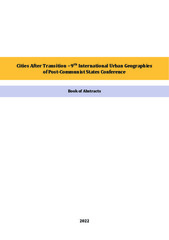Приказ основних података о документу
Urban Regeneration in Post-Socialist Serbia under Neoliberal Capitalism – Belgrade Example
| dc.creator | Maričić, Tamara | |
| dc.creator | Pantić, Marijana | |
| dc.creator | Čolić, Nataša | |
| dc.date.accessioned | 2022-10-28T07:37:57Z | |
| dc.date.available | 2022-10-28T07:37:57Z | |
| dc.date.issued | 2022 | |
| dc.identifier.isbn | 978-963-489-479-7 | |
| dc.identifier.uri | http://raumplan.iaus.ac.rs/handle/123456789/669 | |
| dc.description.abstract | The modern-day practice of urban regeneration is generally perceived as a mean of improving the physical and social tissue of cities and towns, along with involvement of stakeholders in decision-making and respect of the basic postulates of sustainability. The experience of the European post-socialist societies has however indicated that market-driven urban development can raise many contradictions and critics. So far, the research studies have shown that the current urban development of post-socialist transitional Serbian society under the auspice of neoliberal capitalism (enthroned on October 5, 2000) has spawned in many cases numerous negative outputs. Within the frame of Serbian proto-democracy, this is an expected consequence of the abolition of the general interest in favor of the private ones which paved the way to private- investors oriented planning, simultaneously neglecting social and environmental dimensions. Negative aspects of the prevailing neoliberal approach to urban regeneration are primarily reflected in the example of the capital of Serbia, Belgrade. Mostly futuristic residential and commercial/business complexes are springing up, mainly in the core center or along waterfronts, the most famous of which is the contradictory Belgrade Waterfront mega-project. New urban (mega)projects are most often shrouded in secrecy, the public is informed from the media, in the phase when all decisions have already been made without proper public participation. Numerous new housing complexes in central municipalities contribute to densification but without provision of accompanying social and educational facilities. The existing COVID-19 crisis has only provided further increase of those negative trends. Though the analysis of some specific urban regeneration projects in Belgrade we will tend to enlighten some lacks of the existing market-oriented planning system, legal regulations, policies, partnerships and other instruments and propose improvements of the existing practice. | sr |
| dc.language.iso | en | sr |
| dc.publisher | Budapest : ELTE Eötvös Loránd University, Institute of Geography and Earth Sciences | sr |
| dc.relation | info:eu-repo/grantAgreement/MESTD/inst-2020/200006/RS// | sr |
| dc.rights | openAccess | sr |
| dc.source | Book of Abstracts: Cities After Transition – 9th International Urban Geographies of Post-Communist States Conference | sr |
| dc.subject | urban renewal | sr |
| dc.subject | urban project | sr |
| dc.subject | post-socialism | sr |
| dc.subject | neoliberalism | sr |
| dc.subject | Serbia | sr |
| dc.title | Urban Regeneration in Post-Socialist Serbia under Neoliberal Capitalism – Belgrade Example | sr |
| dc.type | conferenceObject | sr |
| dc.rights.license | ARR | sr |
| dc.citation.spage | 55 | |
| dc.citation.rank | M34 | |
| dc.description.other | Editors: Márton Berki, Zsolt Bottlik, Michael Gentile, Margit Kőszegi, Gábor Nagy, Judit Timár, Gábor Tolnai and Tünde Virág. | sr |
| dc.identifier.fulltext | http://raumplan.iaus.ac.rs/bitstream/id/2784/maricic_pantic_colic_catference_2022.pdf | |
| dc.identifier.rcub | https://hdl.handle.net/21.15107/rcub_raumplan_669 | |
| dc.type.version | acceptedVersion | sr |

